The need for coming together as people’s representatives in the name of human rights had been long due in India. With the formation of PFHRGD several issues which hitherto have been identified as outside the realm of Members of Parliament (MPs) have finally been overcome. PFHRGD works on human rights issues that confront the country in particular and the world in general. In the last decades there has been a global consensus on better governance and equity based development. The ethos of Millennium Development Goals (MDGs) can be mentioned in this regard and several national polices as well. The operational features of PFHRGD can be listed as below:
-
Hold meetings on a regular basis to debate and identify issues which needs attention from the policy makers
-
Work collective on social development policy issues with special focus on empowerment of the underprivileged
-
The members raise question in the Parliament sessions
-
Constitute fact-finding teams and raise voice on specific realities concerning rights of the underprivileged
-
Cooperate with various governmental and non-governmental organisations (NGOs) that work on development policies and human rights
-
Work with universities and academics
-
Conduct direct interaction with the victims of human rights violation and holds dialogue with the government
PFHRGD meetings
PFHRGD has organized a range of meetings on different human rights issues related both to national and international situations and offers an unique platform for discussion and dialogue. The past PFHRGD meetings have focused on issues such as the Right to Food and Food Security, Human Trafficking, Children’s Rights and Human Rights Issues in Natural Calamities. PFHRGD has been associated with the International Court of Justice and has hosted one of its Judges for discussion on human rights. PFHRDG also collaborates with civil society groups to obtain a broad perspective in its debates. The meetings serves as a forum for politicians and civil society actors to meet and discuss, and to exchange thoughts and ideas.
Past meetings
- National Rural Employment Act and the Right to Food (2005)
- Scope, Achievements and Limitations of International Criminal Court (2005)
- Sex Tourism and Protection of Children’s Rights (2006)
- Democratic Utilization and Sharing of Water Resources in India (2006)
- Child Human Trafficking (2007)
- UN Committee on Economic, Social and Cultural Rights (2008)
- Right to Food for Children (2008)
- Right to Food and National Food Security (2010)
1: National Rural Employment Act and the Right to Food
Host (s): PFHRGD and FoodFirst Information and Action Network (FIAN)
When: 3rd March 2005
Where: New Delhi, India
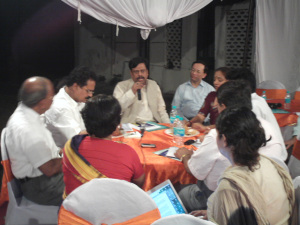 Summary: The prime objective of the meeting was to sensitize the policy makers towards the issue of right to food in the context of the proposed National Rural Employment Bill. It was lead by PFHRGD President, Mr. E.M.S Natchiappan (Rajya Sabha). He called upon the MPs to join the fight for right to food by stating that MPs has the “earnest responsibility to see to it that human rights of our people are being protected and promoted. Since the area of human rights is very wide it is required to focus on some thematic issues that are urgently needed to be addressed. Right to Food is one such area that is most relevant to everyone and in all times.” Representative from FIAN International, Ms. Sabine Pabst, provided information about the importance of the Right to Food in a global perspective. Ms. Sabine said that “Right to Food is the basic human right and the foremost
Summary: The prime objective of the meeting was to sensitize the policy makers towards the issue of right to food in the context of the proposed National Rural Employment Bill. It was lead by PFHRGD President, Mr. E.M.S Natchiappan (Rajya Sabha). He called upon the MPs to join the fight for right to food by stating that MPs has the “earnest responsibility to see to it that human rights of our people are being protected and promoted. Since the area of human rights is very wide it is required to focus on some thematic issues that are urgently needed to be addressed. Right to Food is one such area that is most relevant to everyone and in all times.” Representative from FIAN International, Ms. Sabine Pabst, provided information about the importance of the Right to Food in a global perspective. Ms. Sabine said that “Right to Food is the basic human right and the foremost 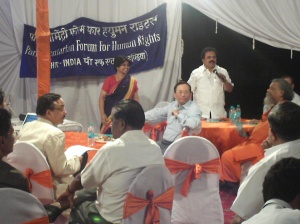 issue that needs to be dealt with”. In all, 52 Members of Parliament participated in th e meeting and made valuable observations and suggestions. The meeting was also attended by renowned human rights activist. The participants discussed the right to food in the context of international documents such as the United Nations Declaration of Human Rights, the International Covenant on Economic, Social and Cultural Rights and the International Covenant on Civil and Political Rights. Furthermore, the forum discussed to work for the enactment of National Rural Employment Guarantee Act (NREGA). One core outcome of the meeting was a strengthening of the MPs pro-active role in the movement towards the right to food in India, and linking it to food security both at a national and international level. MPs who attended the meeting included Prof. M. Ramadass. Mr. R. P Verma, Dr. T. Singh, Dr. M. Singh, Dr. C. Krishanan and Dr. T. Gowda.
issue that needs to be dealt with”. In all, 52 Members of Parliament participated in th e meeting and made valuable observations and suggestions. The meeting was also attended by renowned human rights activist. The participants discussed the right to food in the context of international documents such as the United Nations Declaration of Human Rights, the International Covenant on Economic, Social and Cultural Rights and the International Covenant on Civil and Political Rights. Furthermore, the forum discussed to work for the enactment of National Rural Employment Guarantee Act (NREGA). One core outcome of the meeting was a strengthening of the MPs pro-active role in the movement towards the right to food in India, and linking it to food security both at a national and international level. MPs who attended the meeting included Prof. M. Ramadass. Mr. R. P Verma, Dr. T. Singh, Dr. M. Singh, Dr. C. Krishanan and Dr. T. Gowda.
2: Scope, Achievements and Limitations of International Criminal Court (ICC)
Host (s): PFHRGD and Indian Campaign on International Criminal Court
When: December 2005
Where: New Delhi, India
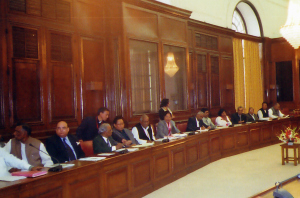 Summary: The aim of the meeting was to involve MPs in the international legal aspects of human rights and link it to national and local level. This is important to ensure that human rights concerns are dealt with efficiently at all levels. The establishment of a network of MPs and ICC should be one of the factors put in place to enhance this work. During the meeting, PFHRGD sought to spur the formation of a committed party-neutral community of MPs who would raise human rights issues during Parliament sessions. This committee would be a part of strengthening India’s commitment to the protection and promotion of human rights in laws and conventions ratified by the Indian government both at a national and international level. Intensified field visits and case reporting should be included to ensure accountability.
Summary: The aim of the meeting was to involve MPs in the international legal aspects of human rights and link it to national and local level. This is important to ensure that human rights concerns are dealt with efficiently at all levels. The establishment of a network of MPs and ICC should be one of the factors put in place to enhance this work. During the meeting, PFHRGD sought to spur the formation of a committed party-neutral community of MPs who would raise human rights issues during Parliament sessions. This committee would be a part of strengthening India’s commitment to the protection and promotion of human rights in laws and conventions ratified by the Indian government both at a national and international level. Intensified field visits and case reporting should be included to ensure accountability.
Judge Mr. Phillippe Kirsch, President of the ICC, engaged in conversation with MPs from various political parties. The MPs raised 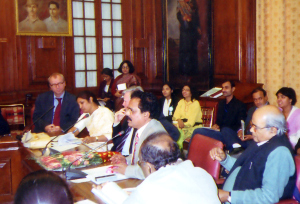 several questions on human rights abuses in a global perspective and the discussion centred around the possibility of safeguarding the rights of people through global and country level legal mechanism. The ICC President held that a stronger commitment of the United Nations member states could bring about a better human rights situation all over the world. He also expressed his dissatisfaction over the failure of various member states to live up to the expectations consented at the global platform such as ICC. He categorically mentioned that an emerging power like India could contribute much more in this regard. Human rights violations such as trafficking, child labour, non-fulfilment of the right to education, and violence against women were among the many topics discussed during the meeting. D. Puraneswari, D.S. Hooda, Prof. K.M.K. Mohideen, Ajay Maken, MD Mistry, L. Liana and Preneet Kaur were among the attending members of Parliament.
several questions on human rights abuses in a global perspective and the discussion centred around the possibility of safeguarding the rights of people through global and country level legal mechanism. The ICC President held that a stronger commitment of the United Nations member states could bring about a better human rights situation all over the world. He also expressed his dissatisfaction over the failure of various member states to live up to the expectations consented at the global platform such as ICC. He categorically mentioned that an emerging power like India could contribute much more in this regard. Human rights violations such as trafficking, child labour, non-fulfilment of the right to education, and violence against women were among the many topics discussed during the meeting. D. Puraneswari, D.S. Hooda, Prof. K.M.K. Mohideen, Ajay Maken, MD Mistry, L. Liana and Preneet Kaur were among the attending members of Parliament.
3: Sex Tourism and Protection of Children’s Rights
Host (s): PFHRGD and National Legal Service Authority (NALSA)
When: 5th February, 2006
Where: Goa, India
Summary: The meeting was a part of an attempt to initiate a National Legal Literacy Mission to combat sex tourism and protect 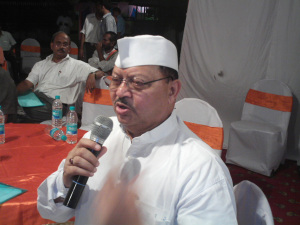 children’s rights in the states of Goa, Kerala and Rajasthan. Decision makers from all across the country participated. The issue of child sex tourism has long been in the periphery of the rights discourse in India. President of PFHRGD, Mr. Natchiappan argued that “it is high time that we, the Members of Parliament, should start this serious concern with the Government at the centre and find out alternative and effective legal mech anisms”. He also drew attention of the Civil Society Organizations’ role in generating a na tional consensus on fighting child sex tourism. Among the participants was Hon’ble Justice H.L. Gokhale. He said that “the child sex tourism is a vice that is not easily recognize. It has sensitive issues involved and needs absolute awareness and
children’s rights in the states of Goa, Kerala and Rajasthan. Decision makers from all across the country participated. The issue of child sex tourism has long been in the periphery of the rights discourse in India. President of PFHRGD, Mr. Natchiappan argued that “it is high time that we, the Members of Parliament, should start this serious concern with the Government at the centre and find out alternative and effective legal mech anisms”. He also drew attention of the Civil Society Organizations’ role in generating a na tional consensus on fighting child sex tourism. Among the participants was Hon’ble Justice H.L. Gokhale. He said that “the child sex tourism is a vice that is not easily recognize. It has sensitive issues involved and needs absolute awareness and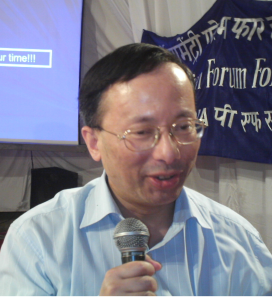 informat ion. Due to their shaded patronage of the system that promotes child sex tourism, it is only appropriate that an organisation like National Legal Service Auth or ity undertakes to make tourism industry aware of the vice”. During the meeting it became evident that a keen interest and concern have developed on the issue, and participants agreed upon the need for proper planning and cooperation on securing children’s rights. It is necessary to generate a consensus among the MPs to work out on a national law against sex tourism in general and child sex tourism in specific and to link country level intervention with international ini tiatives taken up by global institutions such as UN. This must also entail collaboration with civil society groups in fact-finding missions, case reporting, campaigns and networking, to ensure a strong outreach and broad consensus against this severe human rights violation.
informat ion. Due to their shaded patronage of the system that promotes child sex tourism, it is only appropriate that an organisation like National Legal Service Auth or ity undertakes to make tourism industry aware of the vice”. During the meeting it became evident that a keen interest and concern have developed on the issue, and participants agreed upon the need for proper planning and cooperation on securing children’s rights. It is necessary to generate a consensus among the MPs to work out on a national law against sex tourism in general and child sex tourism in specific and to link country level intervention with international ini tiatives taken up by global institutions such as UN. This must also entail collaboration with civil society groups in fact-finding missions, case reporting, campaigns and networking, to ensure a strong outreach and broad consensus against this severe human rights violation.
4: Democratic Utilization and Sharing of Water Resources in India
Host (s): PFHRGD
When: 5th December 2006
Where: New Delhi, India
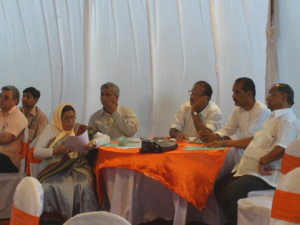 Summary: The objective of the meeting was to discuss a democratic and effective utilization and sharing of water resources in India. It was attended by MPs, experts and technicians. The participants agreed to explore new ways of using rain and flood water in harvesting, as many felt that the states in Indian were not ready to share water resources with the lower riparian states. It was argued that generating hydro-power and employment should be a central objective in water and dam projects. PFHRGD President, Mr. Natchiappan, said that the political parties should include their perspectives on utilization of rivers and water in their political manifestos. He stated that “rivers should no more be a site of sorrow” and stressed the need of using flood water in navigation and irrigation. It was agreed that academics and technicians should be involved in the planning of water projects and that a rethinking of water resources management was crucial. The importance of the meeting can be seen in the presentation of Prof. Kamaraj when he said “the main features of this project are using flood water with controlling mechanism to eliminate power shortages and generate employment.” The theme of the meeting covers a wide range of human rights issues, such as rights to natural resources and a livelihood, property rights, rights to employment, right to food, rights of the displaced etc. National dam and energy projects have been criticised and resisted as a result of the interference and disturbance in people’s livelihood and the displacement of local population. The attending MPs showed commitment to the issue of people’s property, culture, economic and displacement rights and posed a critical intervention on issues related to securing people’s livelihoods. It was agreed that a strengthening of displaced people’s compensation and rehabilitation is necessary. Ganga-Kumari National Waterways Project for Networking of Rivers in India was discussed as a significant effort to reduce the tussle between states in water conflicts and to promote better use of water bodies in the country.
Summary: The objective of the meeting was to discuss a democratic and effective utilization and sharing of water resources in India. It was attended by MPs, experts and technicians. The participants agreed to explore new ways of using rain and flood water in harvesting, as many felt that the states in Indian were not ready to share water resources with the lower riparian states. It was argued that generating hydro-power and employment should be a central objective in water and dam projects. PFHRGD President, Mr. Natchiappan, said that the political parties should include their perspectives on utilization of rivers and water in their political manifestos. He stated that “rivers should no more be a site of sorrow” and stressed the need of using flood water in navigation and irrigation. It was agreed that academics and technicians should be involved in the planning of water projects and that a rethinking of water resources management was crucial. The importance of the meeting can be seen in the presentation of Prof. Kamaraj when he said “the main features of this project are using flood water with controlling mechanism to eliminate power shortages and generate employment.” The theme of the meeting covers a wide range of human rights issues, such as rights to natural resources and a livelihood, property rights, rights to employment, right to food, rights of the displaced etc. National dam and energy projects have been criticised and resisted as a result of the interference and disturbance in people’s livelihood and the displacement of local population. The attending MPs showed commitment to the issue of people’s property, culture, economic and displacement rights and posed a critical intervention on issues related to securing people’s livelihoods. It was agreed that a strengthening of displaced people’s compensation and rehabilitation is necessary. Ganga-Kumari National Waterways Project for Networking of Rivers in India was discussed as a significant effort to reduce the tussle between states in water conflicts and to promote better use of water bodies in the country.
5: Child Human Trafficking
Host (s): PFHRGD, The Child Trust (TCT) and FIAN
When: 21st September 2007
Where: New Delhi, In dia
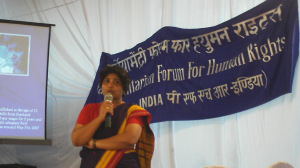 Summary: The meeting was attended by several MPs from most of the major political parties in India. PFHRGD President, Mr. Natchiappan, lead the discussion, while speakers such as Ms. Suman (The Child Trust and FIAN) and Mr. Kamlesh Kumar (Member Secretary of NALSA) contributed with their perspectives and knowledge. Ms. Suman shared two recent trafficking cases that involved young girls who were traf ficked from the villages of Jarkhand to big cities. She explained that due to an increased consumerism people request maids to work as domestic servants. As a result of this increased demand for cheap, low skilled labour, there has been a rise in agencies that retrieve children. These agencies go to the tribal areas in such as Jharkand, Orissa and West Bengal to recruit children for work. When parents go to the fields to do their daily work, the agents find poor children, offers them well paid and nice jobs. Instead of well paid jobs, these children are taken to big cities such as Delhi and Bombay where they wor k as bonded labour.
Summary: The meeting was attended by several MPs from most of the major political parties in India. PFHRGD President, Mr. Natchiappan, lead the discussion, while speakers such as Ms. Suman (The Child Trust and FIAN) and Mr. Kamlesh Kumar (Member Secretary of NALSA) contributed with their perspectives and knowledge. Ms. Suman shared two recent trafficking cases that involved young girls who were traf ficked from the villages of Jarkhand to big cities. She explained that due to an increased consumerism people request maids to work as domestic servants. As a result of this increased demand for cheap, low skilled labour, there has been a rise in agencies that retrieve children. These agencies go to the tribal areas in such as Jharkand, Orissa and West Bengal to recruit children for work. When parents go to the fields to do their daily work, the agents find poor children, offers them well paid and nice jobs. Instead of well paid jobs, these children are taken to big cities such as Delhi and Bombay where they wor k as bonded labour.
The participants were critical of the fact that the Indian Law lacks a proper legal definition on what constitutes human trafficking. In the Immoral Traffic Prevention Act of 1956, some attempts are made of defining the term. However, as it only refers to trafficking for prostitution it does not cover any other form of trafficking. The meeting agreed upon the definition provided by the United Nations (“Prevent, Suppress and Punish Trafficking in Persons”, Article 3): “Trafficking in persons” shall mean the recruitment, transportation, transfer, harbouring or receipt of persons, by means of the threat or use of force or other forms of coercion, of abduction, of fraud, of deception, of the abuse of power or of a position of vulnerability or of the giving or receiving of payments or benefits to achieve the consent of a person having control over another person, for the purpose of exploitation. Exploitation shall include, at a minimum, the exploitation of the prostitution of others or other forms of sexual exploitation, forced labour or services, slavery or practices similar to slavery, servitude or the removal of organs.”.
The MPs stated the need to work for the ratification the United Nations protocol to “Prevent, Suppress and Punish Trafficking in Persons” as a means to end human trafficking in India. Mr. Natchippan stressed the role of Indian MPs in eradicating child trafficking in India. He emphasised the need to identify the most affected states in India in order to formulate policies that can counter these human rights abuses. One of the policies suggested was the establishment of independent anti-trafficking cells in each district police headquarters and ensuring registration of each case. The participants also discussed a need for a separate budget allocation reserved for rehabilitation for trafficking victims, including transitory homes, counselling, vocational training, food, shelter and education.
6: UN Committee on Economic, Social and Cultural Rights (ICESCR)
Host (s): PFHRGD
When: 8th July, 2008
Where: New Delhi, India
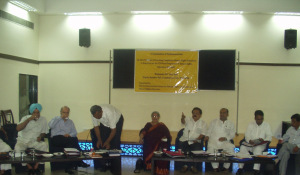 Summary: Ms. M. V Gomez, member of the UN Committee on Economic, Social and Cultural Rights (ICESCR) was special invitee, and participated along with MPs and representatives from civil society. The meeting was lead by PFHRGD President, Mr. Nathciappan. The core objective of the meeting was to create higher awareness of the work of the CESCR among the MPs in order to empower them to follow up on ICESCR conclusions and recommendations in national policy making. PFHRGD aimed to contribute in the process of submitting India’s ICESCR presentation report, which is due in 2011. Ms. Suman, executive director of The Child Trust (TCT) and board member of Food First Information and Action Network (FIAN), explained the main objective of sharing the report at ICESCR at Geneva. She also stressed the crucial role of PFHRGD in drawing a strategy to follow the recommendation made by the committee regarding India’s human rights situation.
Summary: Ms. M. V Gomez, member of the UN Committee on Economic, Social and Cultural Rights (ICESCR) was special invitee, and participated along with MPs and representatives from civil society. The meeting was lead by PFHRGD President, Mr. Nathciappan. The core objective of the meeting was to create higher awareness of the work of the CESCR among the MPs in order to empower them to follow up on ICESCR conclusions and recommendations in national policy making. PFHRGD aimed to contribute in the process of submitting India’s ICESCR presentation report, which is due in 2011. Ms. Suman, executive director of The Child Trust (TCT) and board member of Food First Information and Action Network (FIAN), explained the main objective of sharing the report at ICESCR at Geneva. She also stressed the crucial role of PFHRGD in drawing a strategy to follow the recommendation made by the committee regarding India’s human rights situation.
Starting the discussion, Ms. Gomez said that in order to bring equity among Indian citizens to access their economic, social and cultural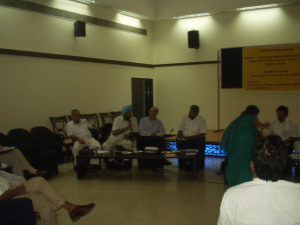 rights, it is imperative to follow up, regularly, all the conclusions and recommendations made by ICESCR. She said that “we have made recommendations and conclusion on the basis of collecting information from various civil societies, government data and reports, research and studies, so these concluding recommendations are concrete facts”. MP, Prof. M. Ramadass, took the discussion towards the economic, social and cultural rights of the fisherman community. He briefed the meeting on the displacement problems faced by fishermen who lives near seashore, due to mega projects and development plans. He suggested that the future PFHRGD mode of action should be ensuring that the fishermen would get full enjoyment of their rights. MP Mr. Ravi Prakash Verma, introduced the theme of extreme poverty in India. He said that despite of economic growth, extreme poverty is still a severe problem faced by a big part of the population. Mr. Verma argued that the solution lies in the empowerment of poor people and ensuring their access to all the rights and entitlements. The answer is not found in charity. The meeting concluded with the emergence of a critical perspective on existing laws for protecting human rights as most of them have not succeeded in protecting rights. It was also a manifestation of the active association of PFHR and civil society organizations. Among the participants were Prof. M. Ramadass, Mr. R. P Verma, Dr. T. Singh, Dr. M. Singh, Dr. C. Krishanan and Dr. T. Gowda.
rights, it is imperative to follow up, regularly, all the conclusions and recommendations made by ICESCR. She said that “we have made recommendations and conclusion on the basis of collecting information from various civil societies, government data and reports, research and studies, so these concluding recommendations are concrete facts”. MP, Prof. M. Ramadass, took the discussion towards the economic, social and cultural rights of the fisherman community. He briefed the meeting on the displacement problems faced by fishermen who lives near seashore, due to mega projects and development plans. He suggested that the future PFHRGD mode of action should be ensuring that the fishermen would get full enjoyment of their rights. MP Mr. Ravi Prakash Verma, introduced the theme of extreme poverty in India. He said that despite of economic growth, extreme poverty is still a severe problem faced by a big part of the population. Mr. Verma argued that the solution lies in the empowerment of poor people and ensuring their access to all the rights and entitlements. The answer is not found in charity. The meeting concluded with the emergence of a critical perspective on existing laws for protecting human rights as most of them have not succeeded in protecting rights. It was also a manifestation of the active association of PFHR and civil society organizations. Among the participants were Prof. M. Ramadass, Mr. R. P Verma, Dr. T. Singh, Dr. M. Singh, Dr. C. Krishanan and Dr. T. Gowda.
7: Right to Food for Children
Host (s): PFHRGD, FIAN India and CTC
When: 22nd October, 2008
Where: New Delhi, India
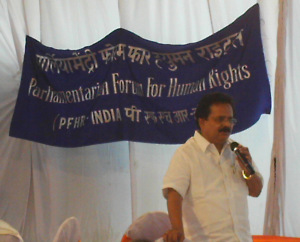 Summary: The meeting was opened by PFHR President, Dr. Natchiappan with the clear message that “MPs can really make a great deal of contribution in heralding the rights of underprivileged by starting interventions from our own electoral constituencies”. Several MPs from various political parties attended the meeting. Everyone made valuable contributions to the discussion which mainly focused on the present reality of children’s rights in India, what can be done collectively for ensuring food rights and health of children and how to expand existing programs and schemes. MP from Orissa, Mr. B. K. Deo, talked about the crisis of implementation of the Right to Food and employment related programs in the country. “NREGA as an employment opportunity and a source of living is a crucial policy towards food security in the country, but the implementation in various regions has been disappointing with a low level of accountability and the non-provision of women and child friendly work environment and infrastructure like the case of not providing crèches at the worksites.” Touching upon another dimension of children’s right to food, Mr. Deo said that the Mid Day Meal (MDM) Scheme in the country has been subject to various problems like the non-provision of the scheme in remote areas, the non-functioning of s
Summary: The meeting was opened by PFHR President, Dr. Natchiappan with the clear message that “MPs can really make a great deal of contribution in heralding the rights of underprivileged by starting interventions from our own electoral constituencies”. Several MPs from various political parties attended the meeting. Everyone made valuable contributions to the discussion which mainly focused on the present reality of children’s rights in India, what can be done collectively for ensuring food rights and health of children and how to expand existing programs and schemes. MP from Orissa, Mr. B. K. Deo, talked about the crisis of implementation of the Right to Food and employment related programs in the country. “NREGA as an employment opportunity and a source of living is a crucial policy towards food security in the country, but the implementation in various regions has been disappointing with a low level of accountability and the non-provision of women and child friendly work environment and infrastructure like the case of not providing crèches at the worksites.” Touching upon another dimension of children’s right to food, Mr. Deo said that the Mid Day Meal (MDM) Scheme in the country has been subject to various problems like the non-provision of the scheme in remote areas, the non-functioning of s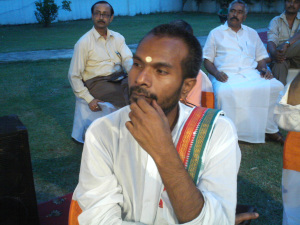 chools and the involvement of contractors who are not concerned with quality and efficient distribution of MDM. Dr. Arjun Sengupta, MP from West Bengal, spoke about the importance of a human rights approach in order to claim and place the rights of children in the country. In his opinion, fulfilling the rights of children was legally and morally binding for the government as the Right to Food constitutes the core of the right to life. Dr. Sengupta held that there is a need to rethink policies such as MDM and Integrated Child Development Scheme (ICDS) vis-à-vis the Right to Food for children. He said that there was a need to universalize MDM for all sections of children and provide nutritious and qualitative food and establish a rigorous follow-up mechanism. MP of Tamil Nadu, Ms. Kanmuri, raised the importance of taking children of 0-2 years of age more seriously in order to ensure full and proper development of children. According to her, children in the age group of 0-2 constitute the most vulnerable section and need best care and policy support. In her opinion existing ICDS programs were not suitable to take care of this vulnerable group. She said that MPs had to take an active part in discussing national nutrition levels of children. Continuing the discussion, Mr. Matilal Sarkar, MP from Tripura, raised concerns regarding the rights of tribals in the India as their rights find no sufficient space in the policy governance in the country. He said that the tribals had been denied education, MDM, ICDS and sufficient participation. MP, Ms. Syeda Taimur wished for more emphasis on proper implementation of MDM. She held that the PFHR and MPs
chools and the involvement of contractors who are not concerned with quality and efficient distribution of MDM. Dr. Arjun Sengupta, MP from West Bengal, spoke about the importance of a human rights approach in order to claim and place the rights of children in the country. In his opinion, fulfilling the rights of children was legally and morally binding for the government as the Right to Food constitutes the core of the right to life. Dr. Sengupta held that there is a need to rethink policies such as MDM and Integrated Child Development Scheme (ICDS) vis-à-vis the Right to Food for children. He said that there was a need to universalize MDM for all sections of children and provide nutritious and qualitative food and establish a rigorous follow-up mechanism. MP of Tamil Nadu, Ms. Kanmuri, raised the importance of taking children of 0-2 years of age more seriously in order to ensure full and proper development of children. According to her, children in the age group of 0-2 constitute the most vulnerable section and need best care and policy support. In her opinion existing ICDS programs were not suitable to take care of this vulnerable group. She said that MPs had to take an active part in discussing national nutrition levels of children. Continuing the discussion, Mr. Matilal Sarkar, MP from Tripura, raised concerns regarding the rights of tribals in the India as their rights find no sufficient space in the policy governance in the country. He said that the tribals had been denied education, MDM, ICDS and sufficient participation. MP, Ms. Syeda Taimur wished for more emphasis on proper implementation of MDM. She held that the PFHR and MPs 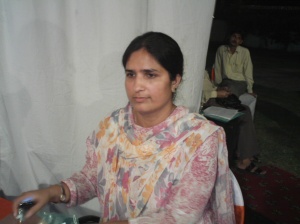 in general could play a bigger role in holding the Government accountable and work for higher degree of implementation. Ms. Taimur brought up the issue of mother’s role in child nutrition, said that helping mothers to get food of better quality and basic financial support would have positive effect on their children. In this regard, Ms. Kanmuri narrated the attempts made in Brazil where the Government has provided support to mothers and pregnant women. She also cited the case of the Government of Tamil Nadu which is providing Rs. 6000 to pregnant women for better food and medical care. Ms. Suman, representative from both TCT and FIAN India emphasized the need for synergy among policies. According to her, understanding and approaching the Right to Food for children should be on the basis of need-based and context-specific policies. She strongly criticized existing policies such as ICDS and MDM for failing to deal with the rights of migrant children, school drop-outs, homeless children, child labourers etc.
in general could play a bigger role in holding the Government accountable and work for higher degree of implementation. Ms. Taimur brought up the issue of mother’s role in child nutrition, said that helping mothers to get food of better quality and basic financial support would have positive effect on their children. In this regard, Ms. Kanmuri narrated the attempts made in Brazil where the Government has provided support to mothers and pregnant women. She also cited the case of the Government of Tamil Nadu which is providing Rs. 6000 to pregnant women for better food and medical care. Ms. Suman, representative from both TCT and FIAN India emphasized the need for synergy among policies. According to her, understanding and approaching the Right to Food for children should be on the basis of need-based and context-specific policies. She strongly criticized existing policies such as ICDS and MDM for failing to deal with the rights of migrant children, school drop-outs, homeless children, child labourers etc.
The consultation was concluded with an understanding on fighting against all forms of deprivation of child rights and particularly the Right to Food. It was accepted that unless the Right to Food for children is achieved, the growth and development of a country was not possible in true sense. The PFHR, thus, concluded with a renewed hope to fight for the Right to Food for children in association with CSOs and concerned groups.
8: Right to Food and National Food Security
Host (s): PFHRGD and FIAN India
When: 24th February 2010
Where: New Delhi, India
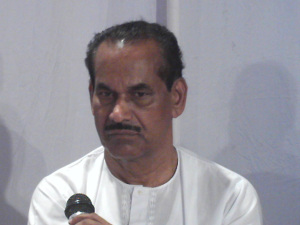 Summary: The meeting was lead by PFHRGD President, Mr. Natchiappan and attended by various MPs. Secretary General of FoodFirst Information and Action Network, Dr. Flavio, was specially invited to share his view on the theme food security and involve the MPs in a discussion on what factors that directly and indirectly affect food security in India. The context was the Government initiative on introducing a National Food Security Act during the winter session of 2010. Dr. Flavio emphasised that the term food security not only entails access to food, but also physical availability of the food, nutritional aspects and the question of sustainability. Food Security is a broad term, an a national food security act cannot purely focus on providing subsidised food to people living under the poverty line, as income not necessarily control your access to nutritious food. The participants also discussed whether access to safe drinking water should be included in a national food security act, and it was argued that it should due to the threat contaminated water pose on access to food and people’s nutritional conditions. The aspects of health and gender was also included in the discussion. The p
Summary: The meeting was lead by PFHRGD President, Mr. Natchiappan and attended by various MPs. Secretary General of FoodFirst Information and Action Network, Dr. Flavio, was specially invited to share his view on the theme food security and involve the MPs in a discussion on what factors that directly and indirectly affect food security in India. The context was the Government initiative on introducing a National Food Security Act during the winter session of 2010. Dr. Flavio emphasised that the term food security not only entails access to food, but also physical availability of the food, nutritional aspects and the question of sustainability. Food Security is a broad term, an a national food security act cannot purely focus on providing subsidised food to people living under the poverty line, as income not necessarily control your access to nutritious food. The participants also discussed whether access to safe drinking water should be included in a national food security act, and it was argued that it should due to the threat contaminated water pose on access to food and people’s nutritional conditions. The aspects of health and gender was also included in the discussion. The p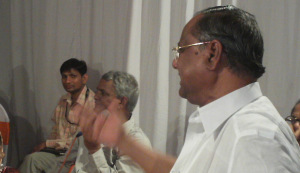 erspective of the farmer and local community was central throughout the meeting. It was argued that a large proportion of the hungry people in India are small farmers and producers. Low income is a major reason for malnourishment as people are unable to have a balanced di et. A range of suggestion were made as to strengthen the farmers’ position. There should be one platform responsible for farmer’s rights to secure a higher degree of coordination and successful implementation. The current system was said to have some serious flaws, such as corruption in the Public Distribution System and in the process of identifying Below Poverty Line families. It was also discussed that poor people belonging to SC/ST were refused food subsidised as a result of not having voted for a certain politicians. By making people aware of their entitlements, people will be empowered to fight for their rights. Furthermore, improved monitoring is central in working against the hinders mentioned. Dr. Flavio shared an example from Brazil, where the government has been able to achieve zero hunger programme by enacting the law on the one side and on the other side adopted an integrated approach with public participation and ensured accountability of the concerned officials. He said that the Brazilian government has promoted local purchase food from small farmers and landless labourers. MP Dr. Swaminathan gave an example of one village in Orissa in Balangir which is called Knowledge centre. In that village each family is given a passbook with the information of all schemes related with food security and processes to access those schemes with monitoring mechanism. The participants concluded that securing food security in India is a question of political commitment to reach the MDGs by 2015.
erspective of the farmer and local community was central throughout the meeting. It was argued that a large proportion of the hungry people in India are small farmers and producers. Low income is a major reason for malnourishment as people are unable to have a balanced di et. A range of suggestion were made as to strengthen the farmers’ position. There should be one platform responsible for farmer’s rights to secure a higher degree of coordination and successful implementation. The current system was said to have some serious flaws, such as corruption in the Public Distribution System and in the process of identifying Below Poverty Line families. It was also discussed that poor people belonging to SC/ST were refused food subsidised as a result of not having voted for a certain politicians. By making people aware of their entitlements, people will be empowered to fight for their rights. Furthermore, improved monitoring is central in working against the hinders mentioned. Dr. Flavio shared an example from Brazil, where the government has been able to achieve zero hunger programme by enacting the law on the one side and on the other side adopted an integrated approach with public participation and ensured accountability of the concerned officials. He said that the Brazilian government has promoted local purchase food from small farmers and landless labourers. MP Dr. Swaminathan gave an example of one village in Orissa in Balangir which is called Knowledge centre. In that village each family is given a passbook with the information of all schemes related with food security and processes to access those schemes with monitoring mechanism. The participants concluded that securing food security in India is a question of political commitment to reach the MDGs by 2015.

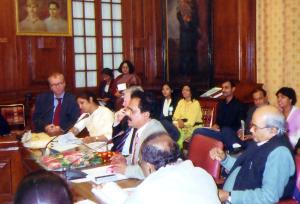
The World Bank estimates that forcible “development-induced displacement and resettlement” now affects 10 million people per year. According to the World Bank an estimated 33 million people have been displaced by development projects such as dams, urban development and irrigation canals in India alone.
India is well ahead in this respect. A country with as many as over 3600 large dams within its belt can never be the exceptional case regarding displacement. The number of development induced displacement is higher than the conflict induced displacement in India. According to Bogumil Terminski an estimated more than 10 million people have been displaced by development each year.
Athough the exact number of development-induced displaced people (DIDPs) is difficult to know, estimates are that in the last decade 90–100 million people have been displaced by urban, irrigation and power projects alone, with the number of people displaced by urban development becoming greater than those displaced by large infrastructure projects (such as dams). DIDPs outnumber refugees, with the added problem that their plight is often more concealed.
This is what experts have termed “development-induced displacement.” According to Michael Cernea, a World Bank analyst, the causes of development-induced displacement include water supply (dams, reservoirs, irrigation); urban infrastructure; transportation (roads, highways, canals); energy (mining, power plants, oil exploration and extraction, pipelines); agricultural expansion; parks and forest reserves; and population redistribution schemes.
It is really important issue to be looked into .Some more specific issues with details will be usfull to take up